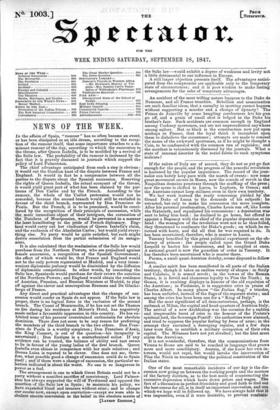NEWS OF THE WEEK.
IN the affairs of Spain, "rumour" has so often become an event, or has been dissipated as an idle dream, according to the recep- tion of the rumour itself, that some importance attaches to a do- - minant rumour of the day, according to which the succession to the throne, after-Queen Isabella, is to be modified by a revival of the Salic law. The probability of the rumour is increased by the fact that it is gravely discussed in journals which support the policy of Lord Palmerston.
The chief advantage anticipated from such a step is obvious : it would cut the Gordian knot of the dispute between France and England. It would in fact be a compromise between all the parties to the dispute about the Spanish succession. Reserving the rights of Queen Isabella, the actual occupant of the throne, it would yield great part of what has been claimed by the par- tisans of Don Carlos and by the French. According to the rumour, the whole of the Carlist pretension would not be conceded, because the second branch would still be excluded in favour of the third branch, represented by Don Francisco de Paula. But the French, it is to be presumed, would be conci- liated by the recognition of their principle of succession, while the more immediate object of their intrigues, the coronation of the Dutchess of Montpensier, would be prevented in a manner the least humiliating to the pride of French diplomacy. Eng- land would carry out her vindication of Queen Isabella 's claim, and the exclusion of the Absolutist Carlos ; but would yield every- thing else. No party would be quite satisfied, but each might derive consolation from the partial submission of its antago- nists.
It is also calculated that the readmission of the Salic law would purchase from the Northern Powers, who are prejudiced against female succession, a recognition of the Spanish Government ; the effect of which would be, that France and England would not be the only powers represented at Madrid, and a very incon- venient diplomatic jealousy would be diminished by the diffusion of diplomatic competition. In other words, by conceding the -Salk law, Spaniards would purchase for their crown the sanction of the Northern Powers; and England would obtain the residence of Austrian, Prussian, and Russian Ministers at Madrid, to play off against the clever and unscrupulous Bressons and De Glucks- bergs of France.
Any direct and practical advantages that the change of suc- cession would confer on Spain do not appear. If the Salic law is proper, there is no logical force in the exclusion of the second branch. The Count of Montemolin, if he has not set the Thames on fire during his residence at Mivart's Hotel, has negatively made rather a favourable impression in this country. He has ex- hibited none of his parents' overstrained enthusiasm for absolute dominion. There does not seem to be any reason for preferring the members of the third branch to the two others. Don Fran- else° de Paula is a worthy simpleton ; Don Francisco d'Assiz, the King Consort, is out of the question—his incapacity is -ascertained ; Don Enrique is a scatterbrained sailor. If any evidence can be trusted, the balance of ability and tact seems to lie in favour of the young ladies of the first branch. Queen Isabella even shines in comparison with her male relatives ; and Donna Luisa is reputed to be clever. One does not see, there- fore, what possible good a change of succession could do to Spain itself ; and if there were a change of succession, the particular se- lection indicated is about the worst. No one is so dangerous in power as a fool.
The arrangement is one to which Great Britain could not be a party without a manifest sacrifice of consistency. Lord Palmer- ston has always supported the will of Ferdinand and opposed the assertion of the Salic law in Spain ; to maintain his policy, we have expended blood and treasure without stint; and to change our course now, except upon conviction—except we were able to ,declare sincere conversion to the belief in the absolute merits of
the Salic law—would exhibit a degree of weakness and levity not a little detrimental to our influence in Europe.
A still larger objection presents itself. The advantages antici- pated from the compromise are applicable only to the temporary state of circumstances ; and it is poor wisdom to make lasting arrangements for the sake of temporary advantages.


























